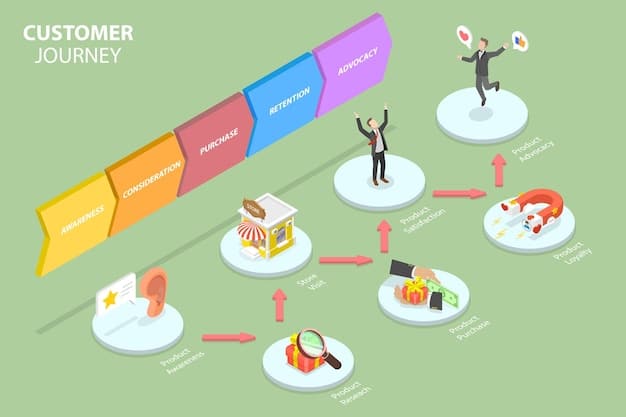Boost Customer Retention: Personalized Onboarding for 15% Growth in 6 Months

Boost Customer Retention by 15% in 6 Months: A Data-Driven Guide to Personalized Onboarding Experiences provides actionable strategies and insights for businesses aiming to improve customer loyalty and satisfaction through tailored onboarding programs.
Are you struggling with customer churn? Do you want to improve customer satisfaction and build long-term relationships? Then, you’re in the right place. This guide, boost customer retention by 15% in 6 months: a data-driven guide to personalized onboarding experiences, will provide you with the knowledge and tools you need to create effective onboarding programs.
We will explore strategies to boost customer retention by 15% in 6 months: a data-driven guide to personalized onboarding experiences by diving into the world of personalized onboarding. This includes data-driven insights and practical tips to ensure your customers have a seamless and engaging introduction to your product or service, fostering loyalty and ultimately driving revenue growth.
Why Personalized Onboarding Is Critical for Customer Retention
Personalized onboarding is no longer a luxury; it’s a necessity. In today’s competitive market, customers expect tailored experiences that meet their specific needs. A generic, one-size-fits-all approach can lead to disengagement and ultimately, churn. Let’s delve into why personalization matters so much.
The Impact of First Impressions
First impressions matter, especially in the digital world. A well-designed onboarding experience can set the tone for the entire customer journey, making customers feel valued and understood from the start.
Understanding Customer Needs
Personalization begins with understanding your customer. Collect data on demographics, preferences, and past interactions to create onboarding experiences that resonate with individual users.
- Utilize surveys to gather feedback on customer expectations.
- Analyze customer behavior to identify pain points and areas for improvement.
- Segment your audience based on demographics and behavior to tailor the onboarding.
Personalized onboarding significantly impacts customer retention by addressing individual needs and expectations. By making customers feel valued and understood from the outset, businesses can foster long-term loyalty and reduce churn. Embracing personalization is crucial for creating a positive customer journey; it encourages repeat engagement and advocacy.

Leveraging Data to Personalize the Onboarding Process
Data is the cornerstone of effective personalization. By leveraging data analytics, businesses can gain valuable insights into customer behavior and preferences, allowing them to create onboarding experiences that are both relevant and engaging. How can you harness the power of data to personalize your customer’s journey?
Collecting Relevant Data
The first step is to collect the right data. This includes demographic information, usage patterns, and feedback from customer surveys.
Analyzing Customer Behavior
Once you’ve collected the data, it’s time to analyze it. Look for patterns and trends that can inform your personalization efforts. This includes understanding how customers interact with your product or service, where they encounter difficulties, and what motivates them to continue using it.
- Use A/B testing to experiment with different onboarding approaches.
- Monitor customer engagement metrics to identify areas for improvement.
- Gather feedback through surveys and customer interviews to understand preferences.
Leveraging data to personalize the onboarding process is essential for boost customer retention by 15% in 6 months: a data-driven guide to personalized onboarding experiences. By analyzing customer behavior, businesses can create tailored onboarding experiences that address individual needs and preferences, leading to higher engagement and satisfaction.
Creating a Seamless Onboarding Experience
A seamless onboarding experience is crucial for retaining new customers. A clumsy onboarding process leaves customers frustrated, hindering their ability to grasp the value of your product or service. Let’s discuss how to make the onboarding experience as smooth as possible.
Simplifying the Process
The key to a seamless onboarding experience is simplicity. Break down complex tasks into smaller, more manageable steps.
Providing Clear Instructions
Ensure that your instructions are clear, concise, and easy to understand. Use visuals, such as screenshots and videos, to guide customers through the process.

- Offer personalized support through live chat or email.
- Provide tooltips and interactive guides to help customers navigate the interface.
- Use progress bars to show customers how far they’ve come in the onboarding process.
By focusing on simplicity, clarity, and accessibility, businesses can create onboarding experiences that not only meet but exceed customer expectations, setting the stage for long-term loyalty and success. Creating a seamless onboarding experience is essential to boost customer retention by 15% in 6 months: a data-driven guide to personalized onboarding experiences.
Personalized Communication During Onboarding
Communication is vital during the onboarding process. Tailored, timely, and relevant communication can guide customers through the initial stages, ensuring they understand the value of your product or service while feeling supported. What channels should you engage?
Email Marketing
Use email marketing to deliver personalized onboarding messages. Segment your audience and send targeted emails based on their needs and behavior.
In-App Messaging
In-app messaging is an effective way to provide real-time support and guidance. Use it to deliver personalized tips, reminders, and announcements.
- Send welcome emails that introduce new customers to your product or service.
- Use personalized product demo videos that showcase key features.
- Share case studies of successful customers who have achieved results.
Personalized communication during onboarding significantly enhances customer engagement and satisfaction. By delivering tailored support and relevant information, businesses can effectively guide customers through the initial stages, fostering a sense of connection and value. Creating a well-designed communication strategy is essential to boost customer retention by 15% in 6 months: a data-driven guide to personalized onboarding experiences.
Measuring the Success of Your Onboarding Program
Measuring the success of your onboarding program is crucial for continuous improvement. Without proper metrics and analysis, it’s impossible to determine whether your efforts are paying off. So, how do you measure the efficacy of your onboarding programs?
Key Performance Indicators (KPIs)
Identify the key performance indicators (KPIs) that are most relevant to your business goals. These may include customer retention rate, time to value, and customer satisfaction score.
Customer Feedback
Collect customer feedback through surveys, interviews, and social media monitoring. Use this feedback to identify areas for improvement and refine your onboarding program.
- Track customer retention rate to measure the percentage of customers who continue to use your product or service over time.
- Monitor time to value to assess how long it takes for new customers to realize the benefits of your product or service.
- Measure customer satisfaction score (CSAT) to gauge customer satisfaction with the onboarding experience.
Measuring the success of your onboarding program is essential for boost customer retention by 15% in 6 months: a data-driven guide to personalized onboarding experiences. By tracking KPIs and gathering customer feedback, businesses can identify areas for improvement and optimize their onboarding strategies for maximum impact, leading to higher customer retention and satisfaction.
Continual Optimization and Iteration
Onboarding is not a one-time effort; it’s an ongoing process. To continually improve your onboarding program, you must regularly analyze data, gather feedback, and make adjustments as needed. Therefore, let’s delve into how you can stay proactive and responsive in refining your onboarding process.
Analyzing Data
Consistently dive deep into your data. Look for patterns, trends, and areas where customers may be struggling. Use this information to identify opportunities for improvement.
Gathering Feedback
Actively seek out customer feedback through surveys, interviews, and usability testing. Understand their pain points and use their insights to guide your optimization efforts.
- Use A/B testing to experiment with different onboarding approaches.
- Monitor the impact of your changes on key performance indicators.
- Implement a feedback loop to gather ongoing insights from customers.
By embracing a culture of continual optimization and iteration, businesses can ensure their onboarding programs remain effective and aligned with customer needs, leading to increased retention and long-term success. Focusing on continual optimization and iteration is key to boost customer retention by 15% in 6 months: a data-driven guide to personalized onboarding experiences.
| Key Point | Brief Description |
|---|---|
| 👋 Personalization Importance | Tailoring onboarding to individual customer needs. |
| 📊 Data Utilization | Analyzing data to enhance onboarding experiences. |
| 💬 Communication Strategy | Providing timely messages based on customer behaviors. |
| 📈 Performance Measurement | Tracking KPIs to evaluate onboarding effectiveness. |
Frequently Asked Questions
Personalized onboarding addresses each customer’s specific needs, creating a more engaging and supportive experience. By tailoring the onboarding process, customers quickly see the value of the product, leading to higher satisfaction and better retention rates.
Key metrics include customer retention rate, time to value, customer satisfaction score (CSAT), and feature adoption rate. Monitoring these metrics helps you identify areas for improvement and optimize the onboarding process.
Communication is crucial for guiding new customers and addressing their questions. Personalized emails, in-app messaging, and proactive support can help customers navigate the onboarding process and understand the product’s value proposition.
Your onboarding program should be continually updated based on customer feedback and data analysis. Regularly review metrics, gather insights, and make adjustments to ensure the program remains effective.
Yes, small businesses can greatly benefit. Even with limited resources, tailoring the onboarding experience by understanding customer needs and providing targeted support is a great way to boost customer retention by 15% in 6 months: a data-driven guide to personalized onboarding experiences.
Conclusion
In conclusion, investing in personalized onboarding is essential for boost customer retention by 15% in 6 months: a data-driven guide to personalized onboarding experiences. And you can see from understanding customer needs to leveraging data-driven insights, following these steps to create a positive customer experience can drive significant growth.
By implementing the strategies outlined in this guide, businesses can create onboarding programs that not only meet but exceed customer expectations. Doing so can foster long-term loyalty and ultimately drive revenue growth.





